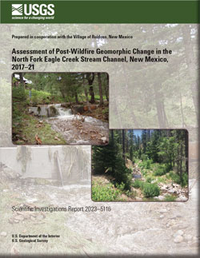Assessment of Post-Wildfire Geomorphic Change in the North Fork Eagle Creek Stream Channel, New Mexico, 2017–21
Links
- Document: Report (7.22 MB pdf) , HTML , XML
- Data Releases:
- USGS data release - Data supporting the 2017 geomorphic survey of North Fork Eagle Creek, New Mexico
- USGS data release - Data supporting the 2018 geomorphic survey of North Fork Eagle Creek, New Mexico
- USGS data release - Data supporting the 2019 geomorphic survey of North Fork Eagle Creek, New Mexico
- USGS data release - Data supporting the 2020 and 2021 geomorphic surveys of North Fork Eagle Creek, New Mexico
- Download citation as: RIS | Dublin Core
Abstract
The 2012 Little Bear Fire caused substantial vegetation loss in the Eagle Creek Basin of south-central New Mexico. This loss was expected to alter the localized hydrologic response to precipitation by creating conditions that amplify surface runoff, which might alter the geomorphology of North Fork Eagle Creek, a major tributary to Eagle Creek. To monitor short-term geomorphic change, annual geomorphic surveys of North Fork Eagle Creek were conducted from 2017 to 2021. The surveys measured 14 cross sections, stream gradients, woody debris accumulations, and pools found within the study reach. During the 2017–21 study period, the study reach experienced multiple high-flow events that resulted from both monsoonal rainfall and snowmelt runoff. Comparisons of the cross-section and channel profile data for the repeat geomorphic surveys indicate localized erosion and deposition occurred as a result of the high-flow events but overall study reach geomorphology shower little change through the study period. Additionally, the number of woody debris accumulations and pools increased during the study period. Evidence from the 5-year geomorphic survey indicates that the North Fork Eagle Creek’s geomorphology did not change substantially during the study period. Wildfire severity and frequency within mountainous regions of the Southwest are projected to increase and their effect on fluvial systems remains uncertain; however, continued geomorphic studies can provide informative insight on watershed post-wildfire resiliency and recovery by establishing baselines that can be used in the event of a future severe wildfire within the Eagle Creek Basin.
Suggested Citation
Nichols, J.R., Chavarria, S.B., and Graziano, A.P., 2023, Assessment of post-wildfire geomorphic change in the North Fork Eagle Creek stream channel, New Mexico, 2017–21: U.S. Geological Survey Scientific Investigations Report 2023–5116, 48 p., https://doi.org/10.3133/sir20235116.
ISSN: 2328-0328 (online)
Study Area
Table of Contents
- Abstract
- Introduction
- Methods
- Results
- Geomorphic Survey of North Fork Eagle Creek From 2017 to 2021
- Discussion
- Summary
- Acknowledgments
- References Cited
| Publication type | Report |
|---|---|
| Publication Subtype | USGS Numbered Series |
| Title | Assessment of post-wildfire geomorphic change in the North Fork Eagle Creek stream channel, New Mexico, 2017–21 |
| Series title | Scientific Investigations Report |
| Series number | 2023-5116 |
| DOI | 10.3133/sir20235116 |
| Publication Date | November 14, 2023 |
| Year Published | 2023 |
| Language | English |
| Publisher | U.S. Geological Survey |
| Publisher location | Reston, VA |
| Contributing office(s) | New Mexico Water Science Center |
| Description | Report: vi, 48 p.; Data Release |
| Country | United States |
| State | New Mexico |
| Other Geospatial | North Fork Eagle Creek Stream Channel |
| Online Only (Y/N) | Y |


